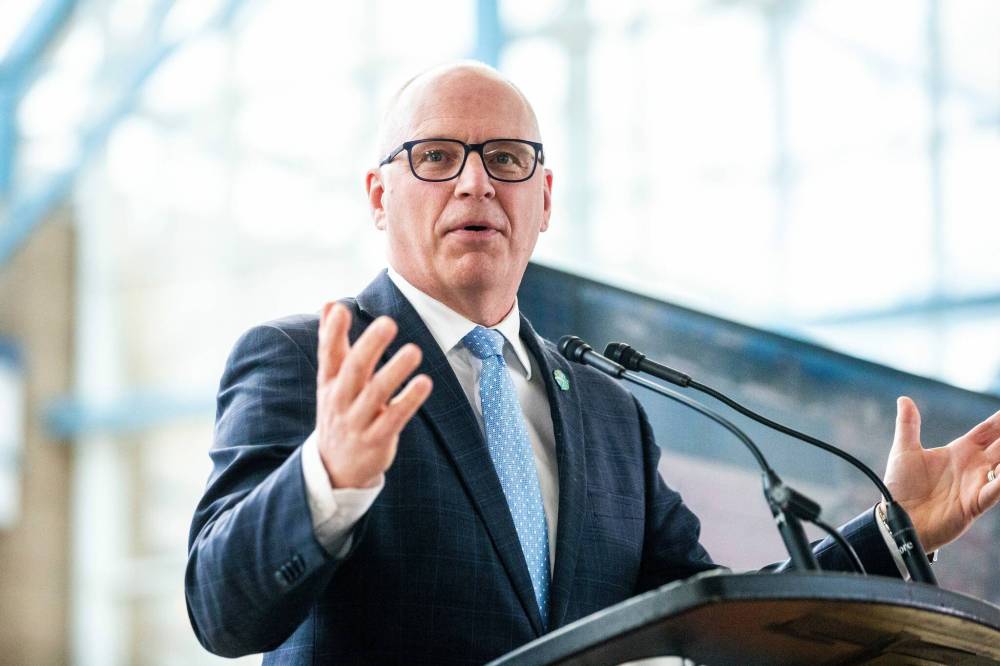Grants of up to $60,000 per unit could soon be available to support new housing construction in Winnipeg, with a key goal to attract affordable and downtown units.
A new city report proposes a program that would dole out $25 million in federal funds to developers of new local housing projects, including non-profit groups.
If council approves, project grants would range from up to $25,000 per unit for downtown market builds, up to $35,000 per unit for general affordable housing and up to $60,000 per unit for affordable downtown housing. Developers of construction outside the downtown who qualify for the general affordable housing grant could also qualify for a $15,000 per unit top-up, if they ensure their projects are “deeply affordable.”

MIKAELA MACKENZIE / FREE PRESS FILES
Winnipeg mayor Scott Gillingham on the proposed grant program: “Too many people are struggling to find a place to live.”
“I’m pleased to see the level of incentives that the public service is recommending. Our housing production is not keeping up with the demand and so we need to get more housing built as soon as possible. Too many people are struggling to find a place to live,” said Mayor Scott Gillingham, who plans to support the proposal.
Gillingham said triggering more affordable housing construction is a top priority. And the top-up for deeply affordable projects outside of the downtown area can help ensure lower-rent homes aren’t overly concentrated in the city’s core.
“I think it’s important that people have a choice in where they live. Even if someone requires a deeply affordable unit, they should still be afforded a choice of communities to live in,” he said.
The city hopes to entice developers to create about 600 units of housing, with about half of them deemed affordable, through the grants.
Successful projects must secure a building permit within one year of approval.
“The goal is to get units built inside of three years, so these have to be immediately built… the challenge is on… to make sure that this program is successful and that we’re getting the money out the door,” said Coun. Sherri Rollins, the chairwoman of council’s property and development committee.
Rollins (Fort Rouge- East Fort Garry) noted the city must add housing quickly to ensure it can claim its entire share of Canada Mortgage and Housing Corp. funding.
CMHC has devoted up to $122.4 million from its Housing Accelerator Fund to Winnipeg over three years, with an overall goal to create 3,166 net new housing units, including 931 that are affordable.
The councillor said the city must claim all available federal government funding to help address a chronic need for affordable homes.
Christina Maes Nino, executive director of the Manitoba Non-Profit Housing Association, said the grants should help non-profit agencies provide deeply affordable housing units.
“That’s really important because (these projects are) serving the lowest-income folks and there isn’t another way to cover those costs. It will still require funding from other levels of government. (This alone is) not enough to make a project viable but… we expect it will help a number of projects be successful where they wouldn’t have been,” said Maes Nino.
She estimated Winnipeg needs to add about 750 deeply affordable housing units in each of the next 10 years, suggesting a rent of less than $900 per month for a two-bedroom unit would fit that category. Maes Nino said operating funding would also be needed to make such housing projects viable.
“For rent-geared-to-income projects, because the incomes of the tenants are so low, there will always be a need from some type of government (operating) subsidy to cover costs,” she said.
The incentives should attract more development to the city’s downtown, according to one member of a not-for-profit affordable housing organization.
“The cost of building has gone sky-high but it’s reasonable that (this) will attract developers.… You’re not going to get a lot of private development going in without (government) funding because the numbers simply don’t work,” said Frank Zappia, owner of Zappia Group Realty and a real estate agent for Housing Opportunity Partnership.
Lissie Rappaport, who manages the city’s housing accelerator fund, said the incentives were chosen through an economic analysis of affordable housing.
“Construction costs have gone up and certainly affordable housing developers are not immune to those increasing costs.… These (incentives) are for non-profit projects, for the most part, (who need this to keep) rent at a lower level,” said Rappaport.
If council approves the plan, developers will be able to begin applying for the grants May 31.
joyanne.pursaga@freepress.mb.ca
X : @joyanne_pursaga

Joyanne Pursaga
Reporter
Born and raised in Winnipeg, Joyanne loves to tell the stories of this city, especially when politics is involved. Joyanne became the city hall reporter for the Winnipeg Free Press in early 2020.